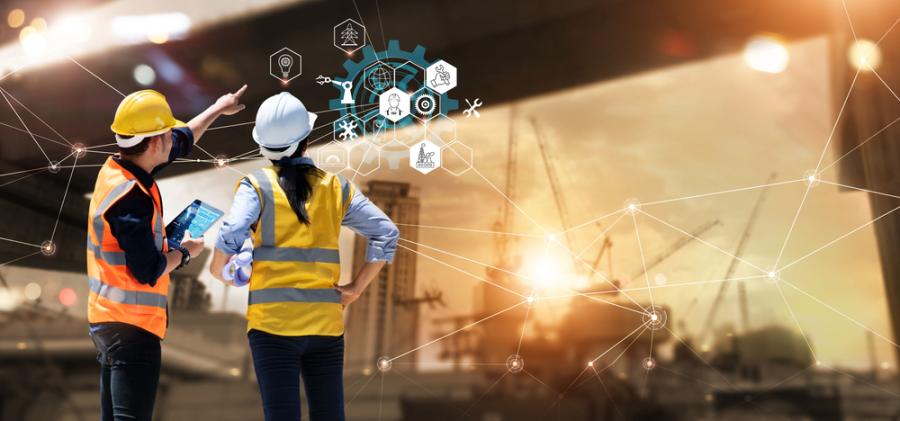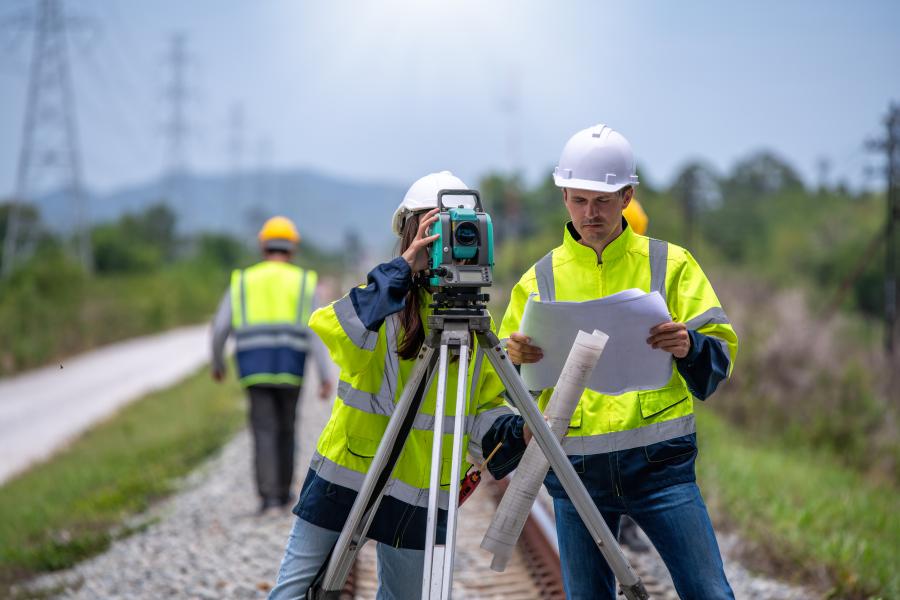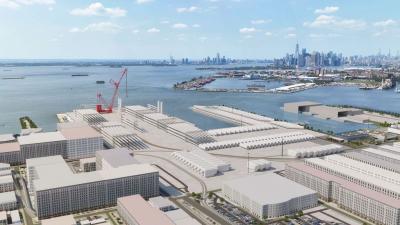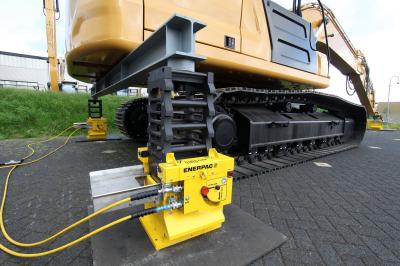Artificial intelligence (AI) is in the construction industry to stay. Consumers use AI daily through their cellphones, while SIRI and Alexa make life more entertaining. However, AI carries some cautions for contractors ready to adopt. New applications are unproven. The technology can't reason on its own. It can't always answer the question, "Why?" It's important to consider the major issues, both good and bad, that AI brings with it to the construction industry.
In a recent AGC webinar on the impact of AI in construction, representatives from both construction and the insurance industry offered information and advice.
Citing statistics, Joe Poliafico of Construction Risk Partners said one of the main areas in construction where AI is used today is in the BIM phase.
As of 2021, some 53 percent of AI use in construction is in the design and planning process, he said. The other 47 percent of AI usage falls under the categories of safety, fleet management and equipment maintenance.
Project managers spend 35 percent of their time on any project trying to resolve conflicts, said Poliafico, a director of the firm.
"So, the idea that AI can be used in BIM space to reduce conflicts, when you think about efficiencies, is absolutely fantastic."
Then there are programs on the market equipped with features to predict accidents, monitor employee practices or plan safety stand downs.
"At what point in the project are you making sure everybody is doing the right thing?" posed Poliafico. "In fleet and equipment, you can track equipment to see what's going on with a vehicle out there for preventive maintenance."
And where labor is concerned, employees in wearables are producing data that can be analyzed for a picture of a project or a company.
"That's a great thing," said Poliafico. "With AI you can pinpoint and get better insurance pricing when the system can show you're a better risk."
Attractive Benefits
Implemented early on in the project planning process, AI tools can help minimize disputes throughout the project, positively impacting profitability.
Ahmed Ismael, FTI Consulting, believes that reducing risk by minimizing accidents and focusing on safety is "of utmost importance" in construction. He sees contractors using AI-driven predictive analytics to monitor previous accidents to identify patterns and facilitate proactive accident prevention measures.
Currently, robotics are automating labor-intensive tasks such as bricklaying and concrete pouring. Robotic systems equipped with AI can work efficiently, accurately and tirelessly, "reducing the reliance on human labor for repetitive tasks," said Ismael. "This will not only enhance productivity but also eliminate the risk of injuries associated with physical tasks."
Going further, the installation of sensors on heavy machinery and equipment to detect wear and tear can predict potential breakdowns in construction fleets.
Consultant Ismael favors the preventive maintenance benefits of AI, noting that the result is reduced downtime and repair costs.
"It also ensures that projects progress smoothly and deadlines are met," he said.
On job sites today, record-keeping is AI-powered so that real-time monitoring systems can provide a comprehensive view of project progress. Performance metrics and potential bottlenecks also can be detected and mitigated with AI-equipped systems.
"By analyzing data from various sources, such as drones, cameras and sensors, AI can facilitate effective decision-making," he said.
In addition to decision-making, an AI system can prompt action to head off emerging issues, Ismael added.
"Construction projects are prone to disputes and disagreements that can lead to costly and time-consuming litigation processes."
AI can help with that, he said, through sped-up review and analysis of legal documents.
"AI-powered contract analysis tools can significantly speed up the process, efficiently scanning contracts to identify potential issues or discrepancies."
And, by analyzing historical data from past cases, AI algorithms can predict potential areas of conflict and assess key risk factors. Early detection of potential disputes allows for preventive measures, encouraging proactive communication and collaboration, he said.
"AI's ability to recognize recurring issues can prompt construction companies to modify practices, minimizing the likelihood of disputes arising in the first place."
Not Without Red Flags
The biggest question construction workers have about AI as it takes on a bigger role in the industry is "Will the technology replace me?"
It's a valid question, but one that both construction and insurance industry consultants say is not that big an issue.
"People worry is AI going to take my job? Absolutely not," said Kevin Dulaney head of technology and innovation of Hotwire.
However, he is quick to qualify that statement, saying, "someone who understands it probably will take that job."
Dulaney, who describes himself as "very passionate about AI," said he sees a shift from the Information Age to the AI Age.
"It's important to understand AI and the subsets of it," Dulaney said in the AGC webinar. "As AI becomes more available, it's going to affect the skillset."
The technology has been around awhile, he said. It's started conversations in construction because of its ability now to create content and intellectual property.
Poliafico asked Dulaney to address the risks and concerns of today's AI research and development.
Dulaney sees the starting point in the discussion as the need for data to expand capabilities and become more accurate. In adopting AI, contractors must consider issues such as where the data is coming from and whether it is clean and unbiased, he said.
"What info am I giving AI? For instance, you're not putting your social security number into an AI system because it could create a model for others."
In that regard, it would be used incorrectly and someone else could have access to your data. That's a critical issue contractors must be aware of.
"There are always services out there to protect your data, but it's important to be cautious, and think about the data," said Dulaney.
He advised listeners that while AI applications are being developed, they, too, should develop policies on how data will be used and who will have access to it.
Polifico was concerned about hacking. "What practical consideration should be given when bringing a platform into the organization?"
In closed models, there can be contracts put in place that stipulate the data cannot be shared, Dulaney said.
"But what is the minimum the party you're sharing with can share? They have to understand the limits of what can be shared with an outside vendor."
Which brings us to another side effect of AI, one of the newest and quickly ballooning expenses for construction companies today: Cybersecurity insurance.
Emily Short, Baldwin Risk Partners, told webinar listeners that the insurance company is just as deeply concerned about cyber criminals as business owners are.
"Will insurance carriers want to see a lot of this data, where do contractors line up and what are the pros and cons?" asked Poliafico, concerned about privacy.
Short, Baldwin's director of cyber product, said contractors have to take a step back and focus on the benefits of AI.
"It's been used a while now in the insurance industry. Cyber is newer insurance so the modeling is not as robust as other lines of coverage."
She said insurance carriers are still trying to figure out ways to help customers understand their exposure and help them price coverage accordingly.
"We're using AI to figure out where vulnerabilities lie within an organization. We use those scans to customize a program for the customer."
She said while it sounds scary, it's beneficial to the insured to protect the construction company from a cyber incident in the first place.
"It gives them knowledge and knowledge is power. Cyber underwriting can be daunting and the premiums have skyrocketed," she said. "It's a hard pill to swallow from both sides. It's hard to budget appropriately when you see spikes."
But the use of AI by cyber criminals is rampant, said Short. The crime changes the way contractors have to look at potential risks.
"Other security controls will use AI to address the risk, but cybercriminals are ahead of us, so we'll have to pay attention to it," she said.
Poliafico cautioned listeners to make sure they're sharing the right info and that it couldn't be used in a bad way. "Privacy issues are astronomical in my mind."
Bethany Barrese, a partner pf Saxe Doernberger & Vita, said the idea that insurance carriers are using AI to handle claims, makes her uncomfortable.
Referring to a case where an insurance company "acted in bad faith," Barrese said the company failed to adequately review claims.
"They took 1.2 seconds to review claims," she said adding the case raises key questions of whether it's bad faith to let AI handle claims.
"Is that reasonable? I also think cases like this will become more frequent. I think this should raise questions for policyholders."
Barrese urged webinar participants to ask their providers how they use AI in the claims process. "And I would ask before I buy a policy."
She said it might be a consideration in purchasing coverage, and if a contractor has a claim denied, he should ask how they used AI to handle the claim.
"This will become more and more relevant as it's used more by insurance companies," she added, referring to AI.
Poliafico suggested contractors have conversations with their brokers and carriers about new technology their bringing into the company.
"How would my policy cover that? Be prepared. Tell your carrier about new technology being used. It's critical, along with the privacy piece." CEG
Today's top stories























